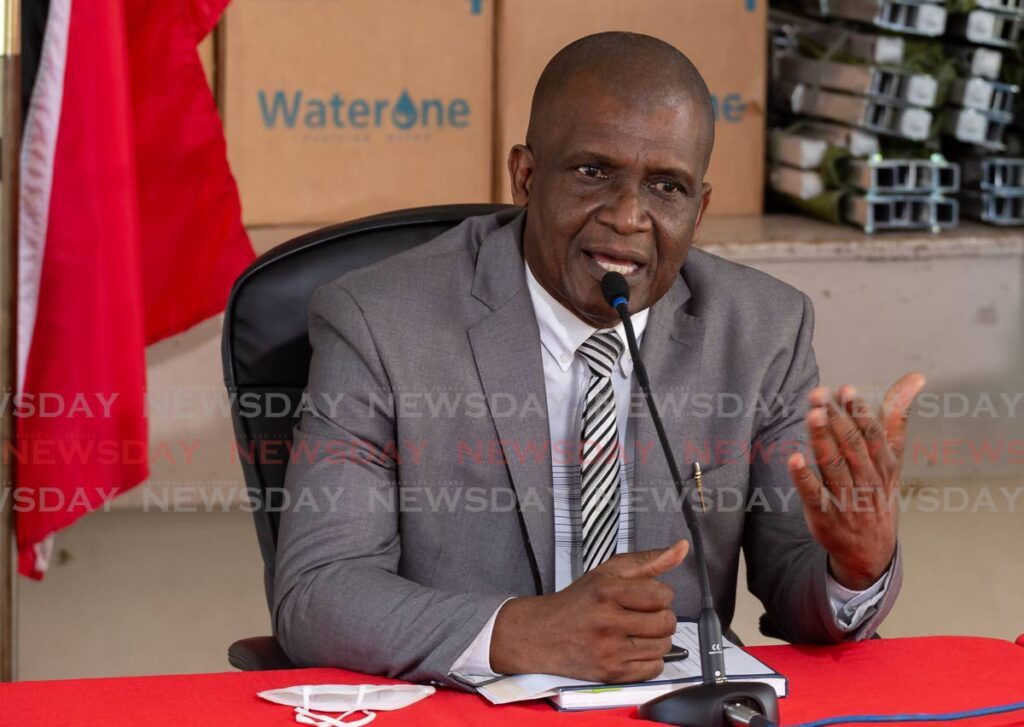TEMA: NOFI containment system will stop oil spread

THE Ministry of Energy and Energy Industries is expected to begin using a new, technology-based recovery system to prevent the oil spill in Tobago from polluting the waters of neighbouring islands.
Tobago Emergency Management Agency (TEMA) director Allan Stewart told Newsday on February 27 that the system, called NOFI’s Current Buster, should be in operation by the weekend or early next week.
The system, available in four sizes, can collect any oil type at speeds up to five knots and is designed for maximum clean-up efficiency. It enables a single vessel to track down and collect scattered oil slicks quickly and effectively.
Stewart was responding to a BBC News article on February 27 which reported that the bunker fuel leaking from the overturned barge – the Gulfstream – off the coast of Canoe Bay, has now reached the island of Bonaire, some 80km north of the Venezuelan coast.
The article said the oil posed a “serious threat to both human and nature.”
The authorities on Bonaire, which is a special municipality of the Netherlands, said the island’s east coast, has been polluted, the article added.
Last week, there were also reports that the spill had entered into the southern part of Grenada’s waters.
Stewart said he did not see the Bonaire article “but the Ministry of Energy has come up with a plan to deal with the oil threat to other territories.
“There is a direct way through a technology called NOFI’s current buster that they will be deploying into operation anytime into the weekend or early next week that we know definitely will take care of those threats to other territories or prevent the spill from going into other territories. So that piece of technology will be at work,” he said.
Stewart said the Ministry of Foreign Affairs also has a role to play in liaising with islands that are under threat of being polluted by the spill.
“The necessary authorities, through Foreign Affairs, they have a role to play in that regard from a national level. Country to country, foreign offices will be speaking. I know that is the protocol where they would verify the reports and then the Ministry of Energy will get involved from a national perspective.”
He said the team has been meeting with a senior technical adviser from International Tanker Owners Pollution Federation Ltd (ITOPF) to discuss issues relating to compensation from oil spills.
They are also in discussions with Petrobras (Brazilian multinational corporation in the petroleum sector).
“What they bring to the table is years of experience based on a similar incident that took place in Brazil. So Petrobras and ITOPF are bringing a considerable amount of knowledge to the table.”
TEMA boss: This is a tier-three operation
Although it has not been declared nationally, Stewart said a tier three operation is in effect in Tobago.
“I think we are in a very good place where we are pointing towards a strong recovery effort. The response so far has been good both locally and nationally.
“While for some reason we have not seen it declared as a tier three, it feels that way, it looks that way, it walks that way, and probably from where I sit, when I look at the national oil spill contingency plan in my mind, I am clear that we are into a tier-three operation.”
Asked to explain a tier-three response, he said, “It speaks to resources or the impact of a hazard which outstrip the resources to mirror it. For example, once it goes beyond your capacity then you are at a tier three where international assistance is required. Therefore, the hazard itself point towards that.
“We are at that stage where we recognise that there was need to do just that, so we could have done the necessaries in building the case towards the escalation from a tier two to a tier three. But it is a pronouncement that is left up to the national government to do.”
Even so, Stewart said the news was still positive. “In the sense that we have a handle on things and therefore all of the machinery or the gears within the machinery is moving towards a recovery effort where we are very strong about.”
Stewart also responded to concerns in some quarters that the recovery process was slow.
He said the logistics was a challenge.
“The distance between Trinidad and Tobago is between 17-22km. So there is the logistics of moving resources. Then you have another spoke in the wheel – procurement.
“How do you co-exist with a national crisis like this and move along with the procurement process? It is a balancing act and one that requires urgency in terms of the response.”


Comments
"TEMA: NOFI containment system will stop oil spread"